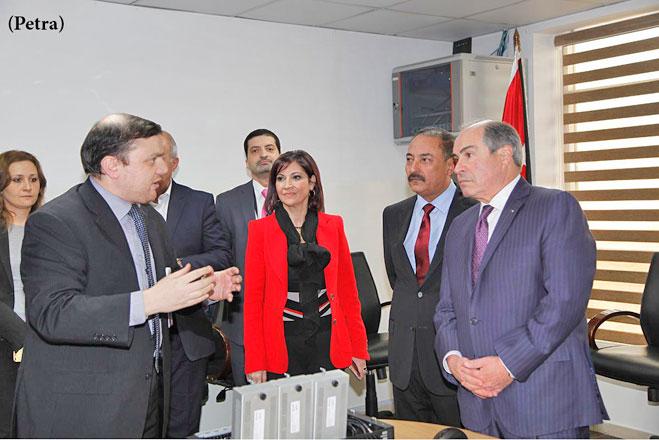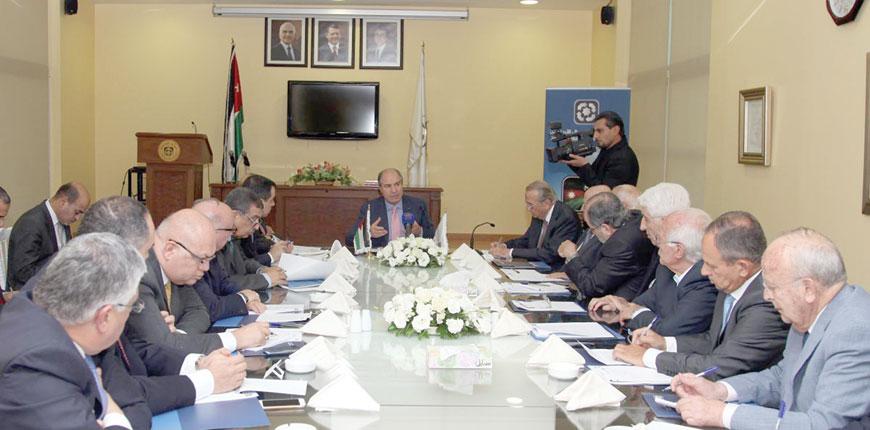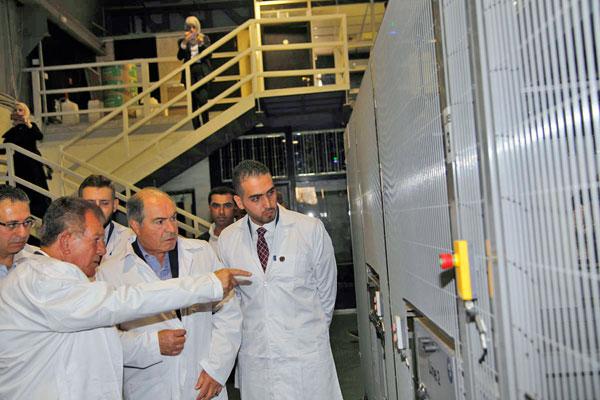You are here
Gov’t seeks fruitful ties with new Parliament — Mulki
By JT - Oct 09,2016 - Last updated at Oct 09,2016
AMMAN — Prime Minister Hani Mulki has said his government will work to forge a strong relationship with Parliament, stressing that he will deliver his policy statement seeking a vote of confidence as Parliament convenes next month.
During a meeting with chief editors of local daily newspapers, Mulki stressed that he did not have any consultations with deputies over the formation of his Cabinet because the Parliament, which was elected on September 20, did not have any blocs yet, stressing that he will seek closer ties with parliamentarians during the course of his work in the coming period.
Mulki’s new government was sworn in before His Majesty King Abdullah on September 28, one week after the elections.
The premier stressed that he sees eye-to-eye with members of Parliament on national interest issues, adding that he respects any differences in points of view over means to implement national programmes and policies intended to serve the country and its citizens.
“I do not think that the government is in disagreement with the Lower House over issues of national interests, which include national security and the well-being of citizens,” said Mulki, who stressed that the role of Parliament complements the role of the executive authority.
“We need the counsel of deputies,” Mulki said, highlighting the need to have a complementary relationship with them.
The premier stressed that Jordan did not reverse the march towards the parliamentary government system, noting that his government still needs the Lower House’s vote of confidence to be able to continue, and that if he wins House approval, he intends to have continuous contact with legislators.
The Parliament is scheduled to start its first ordinary session on November 7.
Mulki said that his government will continue to boost democratic life in Jordan by attempting to strengthen political parties that have solid platforms in a manner that would help them compete effectively in the upcoming parliamentary elections.
Economic plan
The prime minister told chief editors that his government will do its best to improve economic conditions by trying to attract more foreign investments that would “create job opportunities”.
The first step would be improving the business climate in Jordan and luring the “right” investments to the country, said Mulki, insisting that Jordan should not encourage all types of foreign investment, but only those that have qualitative value and which would be able to benefit from Jordan’s relative edge in terms of qualified labour and natural resources.
Mulki said his Cabinet will work to attract such investments, in addition to exerting efforts in opening new markets for Jordanian products, signing new trade deals and activating current ones that have not been enforced, particularly among Arab states.
The government will work to promote Jordan’s competitive qualities to foreign investors, particularly Jordan’s political, monetary and financial stability, by creating the proper legal climate, Mulki said.
In addition, he said that the government has already prepared the Jordan Investment Fund by-law, and is in the final stages of an investment company under this law.
In this regard, he said, Jordan and Saudi Arabia will convene a meeting to coordinate the launch of this company “which will be developed during an upcoming visit by the Saudi king to Jordan”.
The fund law, which was passed earlier this year, allows sovereign funds and Arab and foreign institutions to establish a shareholding company or more to invest in development projects in the Kingdom.
According to the law, the fund has the right to posses, invest and develop projects of the national railway network, the electricity interconnectivity project with Saudi Arabia, and the pipeline to transfer crude oil and fuel derivatives to the Jordan Petroleum Refinery Company. It also includes other projects such as developing infrastructure at the Custodian of the Two Holy Shrines City project and a recreational estate project in Matal in Aqaba, in addition to other projects that may be recommended by the fund’s board, which is chaired by the prime minister.
Jordan and Saudi Arabia have already convened a meeting on the issue in Riyadh, noted the premier.
The prime minister said that there are plans to merge investment funds working in Jordan in one to increase their efficiency and reduce expenses.
Labour
Mulki said work to improve the economy and fight unemployment and poverty also require more focus on improving the qualifications and productivity of Jordanian labourers.
“We should move from talking about the culture of hiring to the culture of creating jobs” particularly by the private sector.
This can be done through proper training programmes, and by offering social security, health insurance and other benefits to workers in the private sector.
In addition, he said that efforts to provide comprehensive health insurance to all Jordanian citizens are under way, noting that the majority of Jordanians are covered by insurance provided by the government, the army and private companies.
Fiscal gap
The prime minister said that the fiscal gap is projected to reach JD230 million this year, JD2.4 billion next year and 2.2 billion in 2018.
This, he added, demonstrates the great challenges facing the government in reducing expenditures and increasing revenues.
To do so, he said, the government is mulling measures to establish partnerships with the private sector in new fields, such as leasing cars for government use, instead of purchasing and owning cars, and like building infrastructure projects as was the case with Tafileh hospital built on the basis of build-operate-transfer, and which after 25 years will be fully owned by the government.
The hospital’s tender was due to be floated earlier this year, Mulki announced during a visit to the governorate, 150km south of Amman, adding that the staff of the hospital will be prepared through a scholarship and training programme.
In addition, the government is continuing its efforts to find new sources of foreign assistance. On September 28, the government signed an agreement with Germany under which the Kingdom will be getting 272 million euros to support the water and education sectors.
In addition, Jordan is getting $480 million from the US and $65 million from the EU in grants this year, he said, adding that there are also loan agreements resulting from the London conference held in February.
Israeli gas
Mulki defended a deal signed last month to buy gas from Israel, stressing that this is a matter of national interest.
The government-owned National Electric Power Company (NEPCO) signed late last month an agreement with Noble Energy for the supply of Israeli gas to meet Jordan’s electricity-generation needs.
The premier said Jordan needs to diversify its energy sources for national security reasons, and will continue to find new sources after the signing of the agreement.
He reminded the chief editors of the problem of interrupted supplies from Egypt, which cost the treasury around JD6 billion over the past years.
He added that gas is not only used to generate electricity, but also by big companies, including the Jordan potash and phosphate companies, whose output constitutes 19 per cent of the GDP, which when added to electricity needs constitute 33 per cent of GDP.
Mulki, who served as energy minister in previous Cabinets, said gas is currently considered the cheapest source of energy, noting that it will be constituting 40 per cent of the Kingdom’s energy mix in the coming years, dropping gradually as the Kingdom starts to utilise other sources, including renewable energy.
Syrian refugees
As to refugees, the premier said Jordan cannot continue to receive any further waves of refugees, but noted that this excludes humanitarian cases.
He paid tribute to assistance that Jordan received but emphasized that the assistance is insufficient to care for the refugees already living in Jordan.
Curricula
Dwelling on the hot issue of curricula changes which caused a controversy since the beginning of the current scholastic year, the premier stressed that the issue was taken out of proportion and hijacked to the street by uninformed parties.
Over the past weeks, there have been several protests and a wave of complaints on social media over what was claimed to be anti-Islamic changes to school curricula.
Mulki emphasized that the expert committees which introduced changes, led by renowned Islamist scholars, did not affect religious content in any negative manner.
He said still the issue of curricula change is an evolutionary process that will continue to serve the higher interests of Jordan and its people.
This process will continue to be carried out by experts in the field of specialisation and should in no way be led by uninformed or unqualified persons.
He said his government was mulling the establishment of an independent commission for curricula, similar to the Independent Election Commission, to work continuously on developing school curricula in a professional manner.
“We should not leave the education of our children in the hands of non-independent parties,” he stressed.
Related Articles
AMMAN — Prime Minister Hani Mulki on Wednesday visited the Telecommunication Regulatory Commission (TRC), the Jordan News Agency, Petra, rep
AMMAN — The government will invite in August 50 to 60 major international companies, businesspeople, expatriates and other interested partie
AMMAN — Prime Minister Hani Mulki, accompanied by a ministerial team, on Thursday visited the Central Badia region and inaugurated a number














